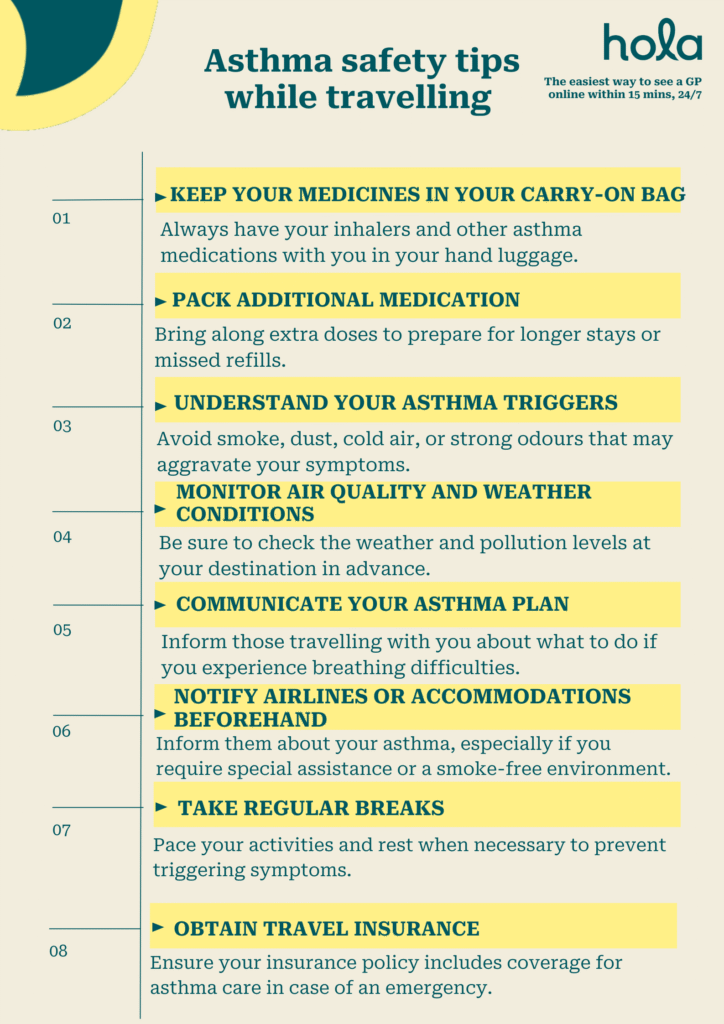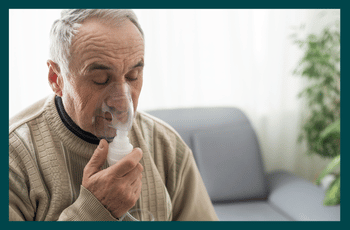7 Tips for managing asthma during travel
Written by the editorial staff writer at Hola. Medically Reviewed by Dr Nelson Lau, MBBS FRACGP, GP & Digital Health Specialist.

Contents

Summary: Travelling with asthma can be difficult due to potential exposure to new triggers, changes in climate, and variations in healthcare availability. However, with careful planning, it is manageable. Key tips include consulting a healthcare provider before travel, carrying an asthma kit with necessary medications together with a written asthma action plan, keeping prescriptions and medications within easy reach, and staying mindful of environmental allergens. It’s also important to prepare for altitude and weather changes, know the locations of nearby medical facilities, avoid overexertion, and manage stress. With these precautions, people with asthma can travel safely and enjoy their trips.
Travel opens the door to new adventures, exciting sights, and unforgettable memories, but it also requires careful planning and precautions for individuals with asthma. Asthma, a chronic respiratory condition characterised by airway inflammation and breathing challenges, can be triggered by weather fluctuations, allergens, stress, or new surroundings. In 2022, around 2.8 million (11%) people in Australia were estimated to be living with asthma, proving that this widespread condition shouldn’t prevent anyone from exploring the globe. From thoughtful planning to avoiding triggers, there are plenty of ways to ensure your next adventure is as smooth and safe as possible.
Importance of planning for asthma control while on vacation
Effective planning is crucial for managing asthma during vacations. It helps avoid flare-ups and prepares you to handle any symptoms that may arise effectively. New environments may expose you to unknown triggers such as pollen, dust, pollution, or weather changes. By preparing in advance—packing enough medication, identifying your triggers, updating your asthma action plan, and researching nearby medical services—you can reduce stress and travel confidently, without unexpected health setbacks. A little planning now means fewer worries later.Understanding asthma triggers
Recognising asthma triggers is key to managing the condition effectively. Triggers are things that can inflame the airways and lead to symptoms like wheezing, coughing, or shortness of breath. Common asthma triggers include:- Irritants: Chemicals, smoke, air pollution, or strong smells
- Allergens: Dust mites, pollen, pet dander, mould
- Weather: Humidity, cold weather, sudden temperature change
- Illnesses: Colds, flu, and respiratory infections
- Exercise: Particularly in cold or dry air
- Emotions and stress: Intense emotions can affect breathing
Also read: How Asthma Action Plans Help You Breathe Easier
Feeling sick and unsure why? Speak with a GP online in 15 minutes.
Preparing before you travel
Careful planning is essential for ensuring safety and enjoyment during your travels, especially for individuals with asthma. Here are some straightforward steps to take before you travel:- Consult your doctor before travelling: Arrange a check-up to ensure your asthma is well-managed. You can also consider using telehealth for a quick online appointment.
- Review your prescriptions: Ensure your asthma medications are up to date and refill them before your trip. Prescriptions may be issued online via telehealth consultation with a doctor if required. Dr Nelson lau comments that ‘In Australia, most asthma medications are subsidised under the PBS, and it’s important to carry a letter from your GP when traveling with prescribed medications, particularly overseas.’
- Bring sufficient medication: Pack enough inhalers and other medications for your trip, plus additional supplies in case of emergencies or delays.
- Remember your spacer: If you utilise a spacer, make sure to include it with your inhaler for more effective medication delivery.
- Keep inhalers in your carry-on bag: Always keep your inhaler in your carry-on luggage, rather than checked baggage, so it's readily accessible while travelling.
Also read: What is thunderstorm asthma? Symptoms and prevention
Smart packing for asthma management
Travelling with asthma doesn't have to be stressful if you're well-prepared. Smart packing can help you stay in control and enjoy your trip:
- Always keep your medications within easy reach: Carry inhalers and other asthma medications in your purse or backpack, rather than in checked luggage.
- Bring extra doses of your medication: According to Dr Lau, check the expiry dates on all medications and consider packing double the amount you typically use, to cover delays or lost luggage.
- Don’t leave your spacer behind: If you use a spacer with your inhaler, make sure to include it, as it helps you inhale the medicine more effectively.
- Have your asthma action plan on hand: Bring along a written plan from your GP that outlines steps to take if your asthma worsens.
- Include a peak flow meter in your packing: This device allows you to monitor your breathing while you’re away from home.
- Be prepared for your asthma triggers: Pack items such as a face mask, scarf, or allergy medications to shield yourself from dust, cold air, or pollen.
- Take copies of your prescriptions: If you’re travelling internationally, carry a letter from your doctor and copies of your prescriptions, just in case.
Asthma safety tips while travelling
Travelling with asthma can be enjoyable and manageable if you follow a few simple guidelines to ensure your safety:
- Keep your medications in your carry-on bag: Always have your inhalers and other asthma medications with you in your hand luggage.
- Pack additional medication: Bring along extra doses to prepare for longer stays or missed refills.
- Understand your asthma triggers: Avoid smoke, dust, cold air, or strong odours that may aggravate your symptoms.
- Monitor air quality and weather conditions: Be sure to check the weather and pollution levels at your destination in advance. This will help you plan appropriately and stay safe during your trip.
- Communicate your asthma plan: Inform those travelling with you about what to do if you experience breathing difficulties.
- Notify airlines or accommodations beforehand: Inform them about your asthma, especially if you require special assistance or a smoke-free environment. Some airlines may require medical clearance for severe asthma or allow early boarding.
- Take regular breaks and avoid overexertion: Pace your activities and rest when necessary to prevent triggering symptoms.
- Obtain travel insurance: Ensure your insurance policy includes coverage for asthma care in case of an emergency while you are away.

Managing asthma on flights
Flying with asthma can be a secure and pleasant experience if you prepare in advance. The cabin air can be dry and pressurised, which might irritate your airways. To prioritise your safety, always keep your inhalers, especially your rescue inhaler, in your hand luggage instead of checked bags. This way, you can access them quickly when needed.
Before your flight, consult your doctor if you have experienced recent asthma flare-ups or hospitalisations; they may recommend adjustments to your medication or provide additional guidance. If necessary, carry a note from your doctor that details your condition and medications for airport security. Or simply consult on-demand doctors anytime, while away.
During the flight, stay hydrated by drinking plenty of water and avoiding caffeinated or alcoholic beverages that may dry out your airways. Try to avoid strong fragrances or aerosol sprays from fellow passengers and request a seat change if necessary.
Staying healthy during travel
Travelling can be thrilling, but it can also disrupt your daily routines and impact your health. To maintain your well-being while travelling, ensure you get sufficient rest before and during your trip to keep your body strong. Stay hydrated by drinking plenty of water, particularly during long flights or in hot weather.
Pack all necessary medications, including extra doses and copies of your prescriptions. Stick to regular meal times and aim to consume light, balanced meals to prevent digestive discomfort. Frequently wash your hands or use hand sanitiser to avoid catching germs in crowded areas such as airports, buses, or tourist attractions. If you have a health condition like asthma, keep your action plan accessible and make sure a travel companion knows how to assist you.
If after the travel you feel you need to rest due to flare ups, consult your GP or a telehealth service to discuss next steps. A medical certificate can be provided if clinically appropriate.
Conclusion:
Asthma doesn’t have to cancel your travel plans; it just needs a place in your luggage. With little preparation and the right mindset, you’ll be set to breathe comfortably and embrace every journey that awaits you.FAQs
What is asthma?
Asthma is a chronic condition that impacts the airways in the lungs, causing challenges with both inhaling and exhaling. The airways can become inflamed and overly sensitive, frequently responding to triggers such as dust, pollen, smoke, cold air, or physical activity. This can lead to wheezing, chest tightness, coughing, and shortness of breath. While asthma can vary in severity, it can typically be managed with medications and by avoiding triggers.What causes asthma?
A combination of inherited and environmental factors causes asthma. People with a family history of asthma or allergies are at a higher risk of developing it. Environmental factors, including air pollution, smoke, pollen, dust mites, pet dander, mould, and respiratory infections, can contribute to the onset or exacerbation of asthma symptoms. In certain instances, symptoms can also be triggered by cold weather, stress, physical activity, or certain medications. The root cause varies from person to person, but it typically involves the immune system overreacting to harmless substances, leading to swelling and tightening of the airways.Can summer heat make asthma worse?
Yes, summer heat can aggravate asthma, as high temperatures often increase air pollution and pollen levels, both common triggers. Hot weather can lead to dehydration and make exercising more challenging for people with asthma. To stay protected, it’s essential to keep cool, avoid outdoor activities during peak heat or pollution, stay hydrated, and always keep your inhaler within reach.Should I talk to a doctor before travelling with asthma?
Yes, it’s wise to consult a doctor before travelling if you have asthma. They can help you review your asthma management plan, adjust medication, and share helpful tips for managing symptoms while away. Your doctor can also ensure you have adequate medication, write prescriptions for emergencies, and inform you about potential risks at your travel destination, such as high altitudes, poor air quality, or common allergens. A quick visit to a doctor can give you peace of mind and help make your trip smooth and safe.What should I pack in my asthma travel kit?
Your asthma travel kit should contain all the necessities to help you manage your condition safely and comfortably while away. Here’s a checklist of essential items:- Reliever inhaler
- Spacer
- Preventer inhaler
- Peak flow meter
- Extra medication
- Copies of prescriptions
How do I manage asthma during a flight?
Managing asthma during a flight requires planning and a few precautions. Here’s how to stay safe and comfortable:- Carry your reliever inhaler in your hand luggage
- Take your preventer medication as prescribed
- Stay hydrated
- Avoid triggers
- Use a mask or nasal spray to combat dry air
- Inform the crew
- Move around on long flights to keep your breathing steady.
Is it safe to travel to places with high pollen or pollution levels?
Travelling to places with high pollen or pollution levels can be difficult for people with asthma. However, with the right precautions, it can still be managed. These environmental factors can include flare-ups, so it’s essential to:- Check air quality and pollen forecasts before your trip
- Travel with all your asthma medications
- Avoid outdoor activities during peak pollen or pollution times
- Wear a mask
- Stay indoors
How can Aussies find a doctor or clinic if they have a serious asthma attack while travelling in Australia?
If you are an Aussie experiencing a severe asthma attack while travelling within Australia, you can get help quickly in several ways:- Call triple zero (000) for emergency medical assistance
- Visit a local clinic or hospital
- Use telehealth services
What we treat
- Cough
- Nausea & vomiting
- Fever
- Hayfever
- Fatigue
- Sore throat
- Acne
- Hair loss
- Gout
- Eczema
- Rosacea
- Sunburn
- UTI
- Erectile dysfunction
- Contraception
- Morning sickness
- Morning after pill
- Prostate health
- Anxiety
- Depression
- Stress
- Grief & loss
- Antidepressants
- Premature ejaculation
- Asthma
- Blood pressure
- Blood thinners
- Diabetes
- Cholesterol
- Migraines & headaches
- Allergies
- Body ache
- Heartburn & reflux
- Sleep disorder
- Pain relief
- Gastro
Related Articles
Disclaimer
This blog is for general informational purposes only and does not indicate that Hola Health provides all treatments or preventive measures mentioned. It is not intended to be a substitute for professional medical advice. Always seek the guidance of your doctor or other qualified health professional with any questions you may have regarding your health or a medical condition. For emergencies please immediately contact 000. Any medical topics discussed are intended to educate, not to imply availability through Hola Health.

Get affordable healthcare on your terms, with quick access to qualified, Australian-registered telehealth doctors & health practitioners, 24/7, 365 days a year. No more searching for ‘doctors near me‘ – Hola connects you instantly.
Address: 79 St Georges Terrace, Perth WA 6000


Hola Health App
Get affordable healthcare on your terms, with quick access to qualified, Australian-registered telehealth doctors & health practitioners, 24/7, 365 days a year. No more searching for ‘doctors near me‘ – Hola connects you instantly.
Call 000 for emergency or urgent medical help.
Address: 79 St Georges Terrace, Perth WA 6000
© Hola Health, a brand of Packapill Pvt Ltd


 Facebook
Facebook  X
X  Copy Link
Copy Link












